One of the great things about traveling in an RV is the availability of many of the comforts of a standard house.
One of the most important of these is hot water, which is exactly why tankless water heaters are such a hot topic in the RVing community.
RV tankless water heaters heat water as you need it. They can provide an endless amount of hot water, but this luxury also comes with a higher initial price tag than traditional units.
While tankless or demand-type water heaters have become a favorite appliance for families and those living full-time in their RV, they also have some downfalls that may not be well-suited for all campers.
We’ve set out to compare RV tankless water heaters with traditional RV hot water heater models to find out what the pros and cons are.
If you’re considering making the switch to a tankless heater or wondering if it’s worth spending on, read on to decide if a tankless unit is right for your RV type, lifestyle and budget.
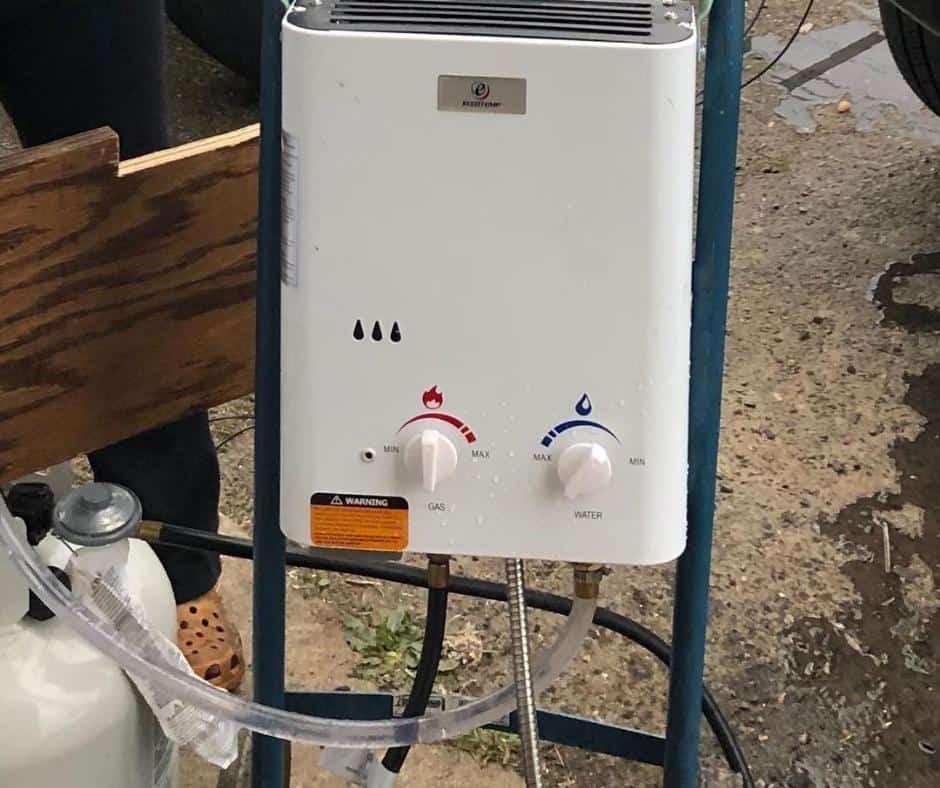
What is a Tankless RV Water Heater?
Tankless RV water heaters are an on-demand way of warming water in your vehicle.
Where traditional water heaters hold a reserve tank of warm water, a tankless heater warms the water as it passes through the heater.
This provides you hot water when you want it, and for as long as you want it.
How Do RV Tankless Water Heaters Work?
Tankless water heaters warm water as you need it, which means that you get an endless supply.
When the water tap is turned on and water begins to flow, it triggers a heat exchanger to kick into action.
Heat exchangers transfer heat from one object to another and are found in many household appliances.
They generate heat to a preset temperature through either electric coils or a gas-fired burner, then transfer this heat to the water as it passes through.
What is the Difference Between A RV Tankless and a Traditional Hot Water Heater?
Tankless water heaters use a heat exchanger to warm water, which means they don’t require a separate holding tank. Traditional water heaters, on the other hand, heat water within a tank.
Traditional water heaters can only supply a limited amount of warm water at any given time because it takes time for new water that enters the tank to heat up.
In RVs, the water heater tank capacity is usually 6-10 gallons, which can go quick when taking showers and washing dishes, especially if you have multiple people doing so.
While tankless heaters may take an average of 10 or more seconds to warm the water passing through, they can provide an endless stream of hot water without any recovery time.
Water heater tanks are also heavy and take up space. They must also constantly be running to keep the water at the set temperature.
Tankless heaters, however, require no additional storage space, and they stay off until you turn the water on to use it.
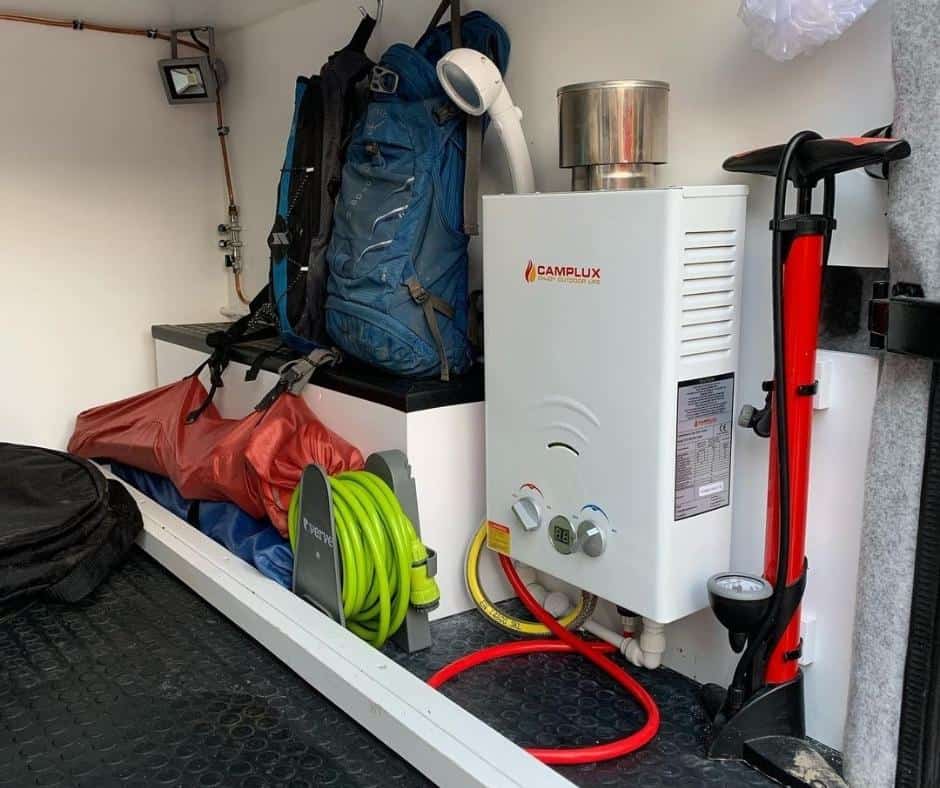
How Much Do Tankless RV Water Heaters Cost?
Tankless water heaters tend to be more expensive, but the overall cost comparison will greatly depend on how you use your RV.
Tankless heaters are not yet standard in RVs, which means that they will automatically be an upgrade.
If your current heater is functioning properly and you don’t feel a strong need for a tankless system, it will likely be much cheaper to stick with the unit already installed in your vehicle.
If you are set on installing a tankless heater, you’ll find that there is a significant range of prices.
While most units will cost more than water heater tanks, the cost of a tankless system will largely depend on its capacity.
The cost of the cheapest RV tankless heaters are comparable to water heater tanks. They can be found for as low as $100-$200, but will only have the ability to heat around 1-1.5 gallons of water per minute, which is only enough for one faucet at a time.
This means that if you want to take a shower while your partner washes dishes, only one of you will get hot water.
The cost of tankless heaters goes up incrementally from here, with the most expensive units capable of heating the water for all faucets at the same time, but costing upwards of $1,000.
Tankless heaters that fall somewhere in the mid-range of these are often preferable. They can cost anywhere between $500-$1,000, providing enough water to heat several faucets with an average of 3-5 gallons of hot water per minute.
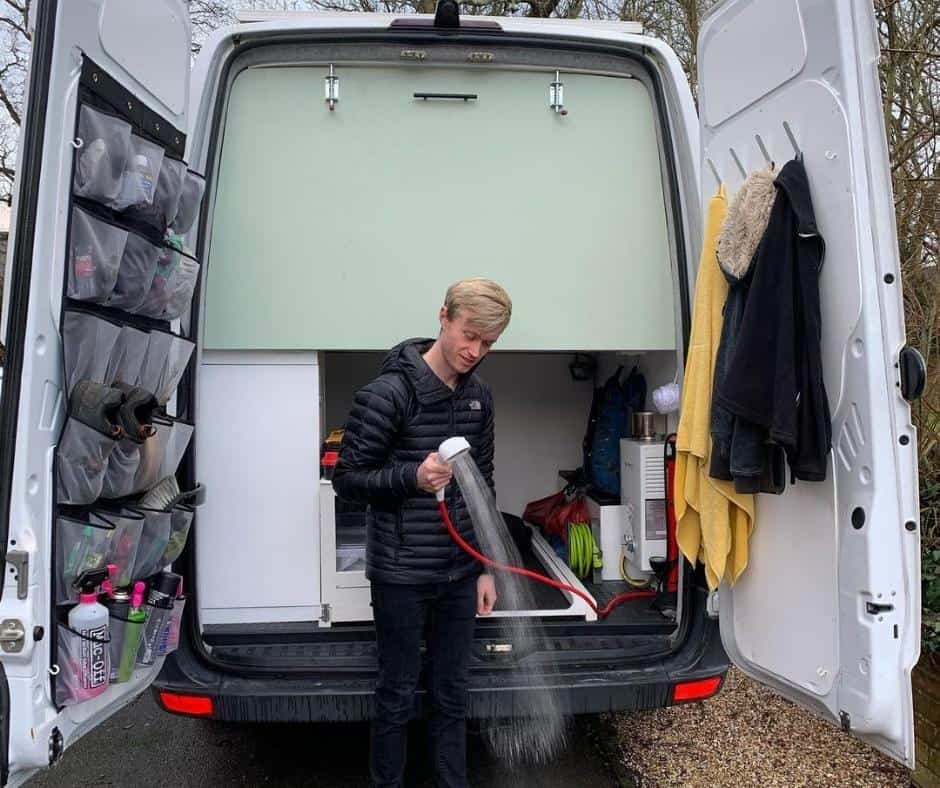
Pros of a Tankless RV Hot Water Heater
The many pros of tankless water heaters make them great for regular hot water usage and multiple people. While the cost of RV-instant-hot-water-heaters is not low, but it is absolutely worth the investment.
Here are the five reasons why you should consider adding a tankless to your RV
-
They create an endless, on-demand stream of hot water
-
There is no recovery time between hot water uses
-
Tankless hot water heaters are safer because they turn off between uses, reducing the risk of overheating
-
They weigh less and take up less room by eliminating the need for a bulky tank
-
With tankless you’ll never have to deal with hard water building up because the system is flushed each time it is used
With so many great features, you may be tempted to run out and buy a new tankless water heater for your next trip.
But before you do so, there are a few more aspects to consider.
Where Tankless RV Water Heaters Fall Short
Tankless water heaters can make a world of difference in the comforts of daily use, but they also come with some drawbacks that may not make them the best choice for everyone.
Tankless Water Heaters Require a Lot of Power to Run on Electricity
While there is a choice between gas and electric tankless heaters when they are installed in standard homes, RVs generally don’t have enough power to support electric heaters.
That really only the option of a gas heater, whereas water heater tanks sometimes offer the option of switching between gas and electric.
For anyone who is regularly hooked up to an electrical source, this may mean propane costs you didn’t previously have.
Tankless Heaters Use More Water
Another area where tankless RV water heaters fall short is water consumption. Because the flow of water is what first triggers the heater to turn on, it is necessary to run several seconds of cold water before it ever heats up.
While this may not be a problem while connected to a water line, those cups can add up quickly for anyone boondocking with a limited supply of water.
This needs to happen each time the water is turned on again, meaning that anyone trying to conserve water will rarely keep the faucet on long enough for it to heat up.
FAQ About RV Tankless Water Heaters
Is Gas or Electricity Cheaper to Operate?
In general, electric heaters tend to be cheaper to operate than gas heaters.
However, the cost difference in terms of RVs will not be nearly as great as it is for tankless heaters installed in houses.
RVs can generally only support point-of-use electric heaters and gas powered tankless water heaters.
Although the electric heater will save a small amount of propane, you will still be using gas for other faucets and appliances, and the end difference will probably be nothing compared to the cost of installation.
Can You Convert a Standard Water Heater to a Tankless System?
Yes, it is possible to convert a standard water heater to a tankless system.
Most RV heaters are standard models, meaning that the corresponding tankless unit will fit into the space from the old unit.
But before you pull out a screwdriver, there are a few things to pay attention to in your new tankless heater:
-
Confirm that the dimensions of the tankless heater match the space of your previous model
-
Make sure that the vents of your new tankless heater are in the same position as those on the old heater
-
Check that all propane and water connections fit, or that you purchase the necessary adaptors
Once you’ve chosen a unit that will fit your RV, you’re ready to remove the old heater and install the new system.
Is a Tankless Heater Difficult to Install?
It will probably not be difficult to install a tankless heater for anyone who is confident with some mechanical and electrical operations.
The process simply requires removing the old heater and replacing it with the new system, but it is important to follow the steps in the correct order and to make all of the correct connections.
Remember that it is important to first isolate the electrical, propane, and water supplies.
It is then also important to keep reference of everything that you disconnect in the process so that it can be reconnected properly again.
Take your time in removing the old unit and cleaning the area to make sure the new system is properly installed, sealed, and bonded to your RV.
Safety should always come first, and anyone who doesn’t feel entirely comfortable doing it themselves should have a professional do the installation.
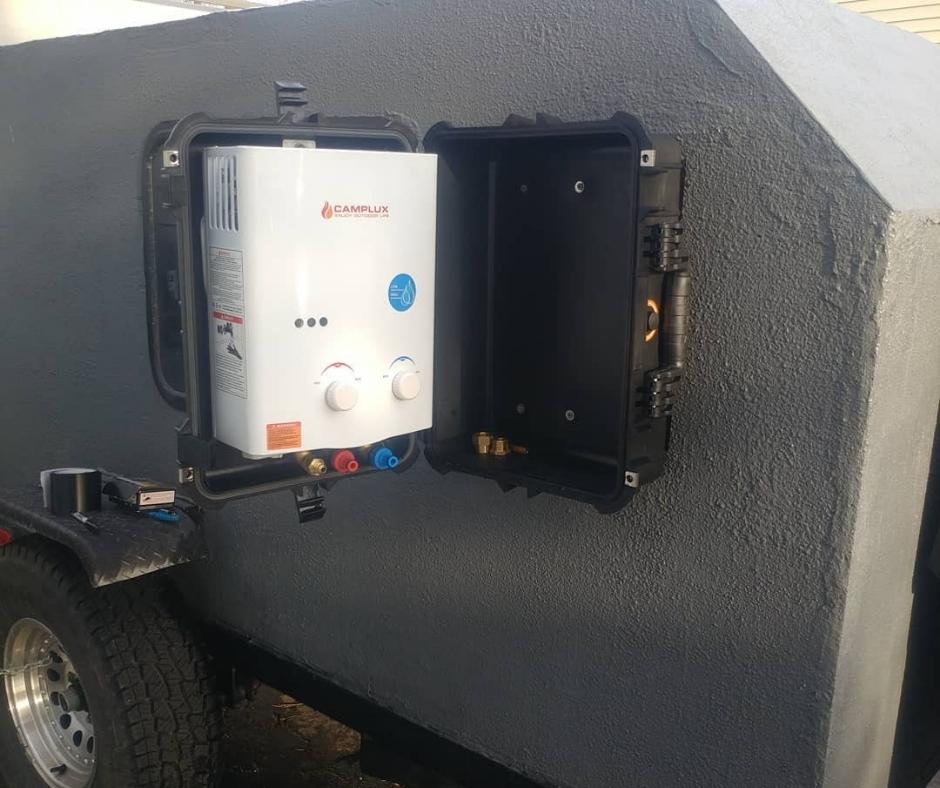
Should You Consider a Tankless Water Heater for your RV?
For anyone living in their RV full-time, or for those whose RV needs to accommodate the water usage of several people, a tankless heater can be the answer to eliminating cold showers and unnecessary wait times.
However, tankless units can be costly, are not ideal for conserving water, and they will make you dependent on propane.
If your RV regularly runs out of hot water when you need it, then it may be time to consider upgrading to a tankless system.
For all others, sticking with a traditional system will likely provide sufficient amounts of hot water, along with the potential to save on water and energy costs down the line.

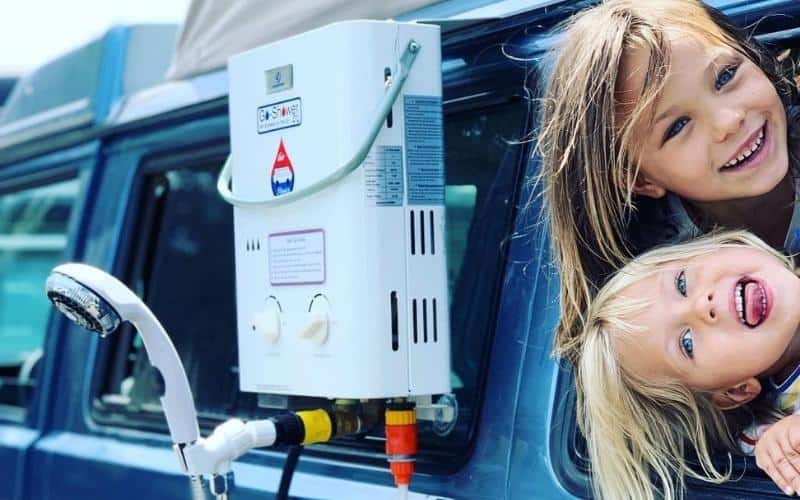
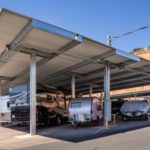

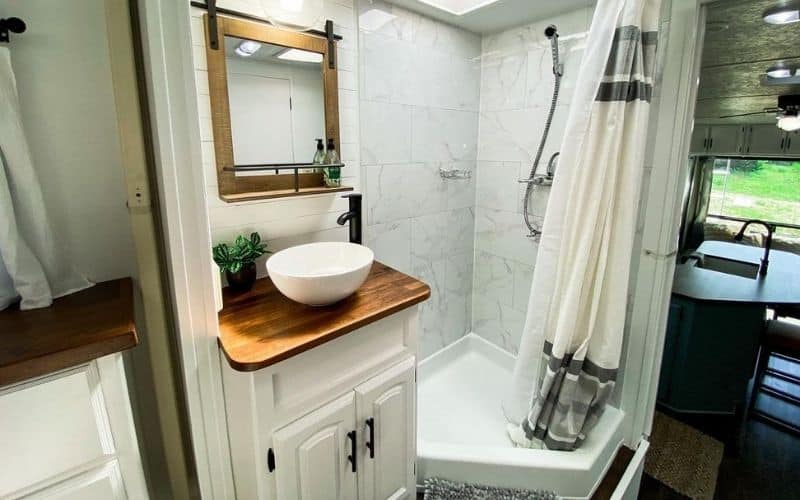
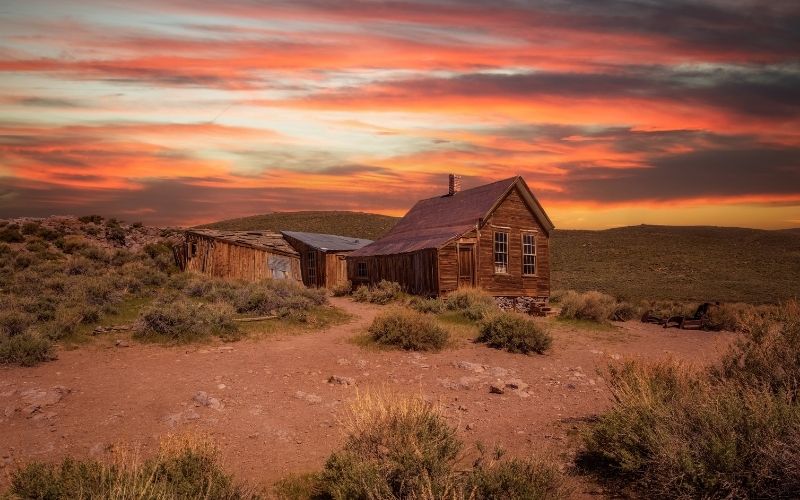
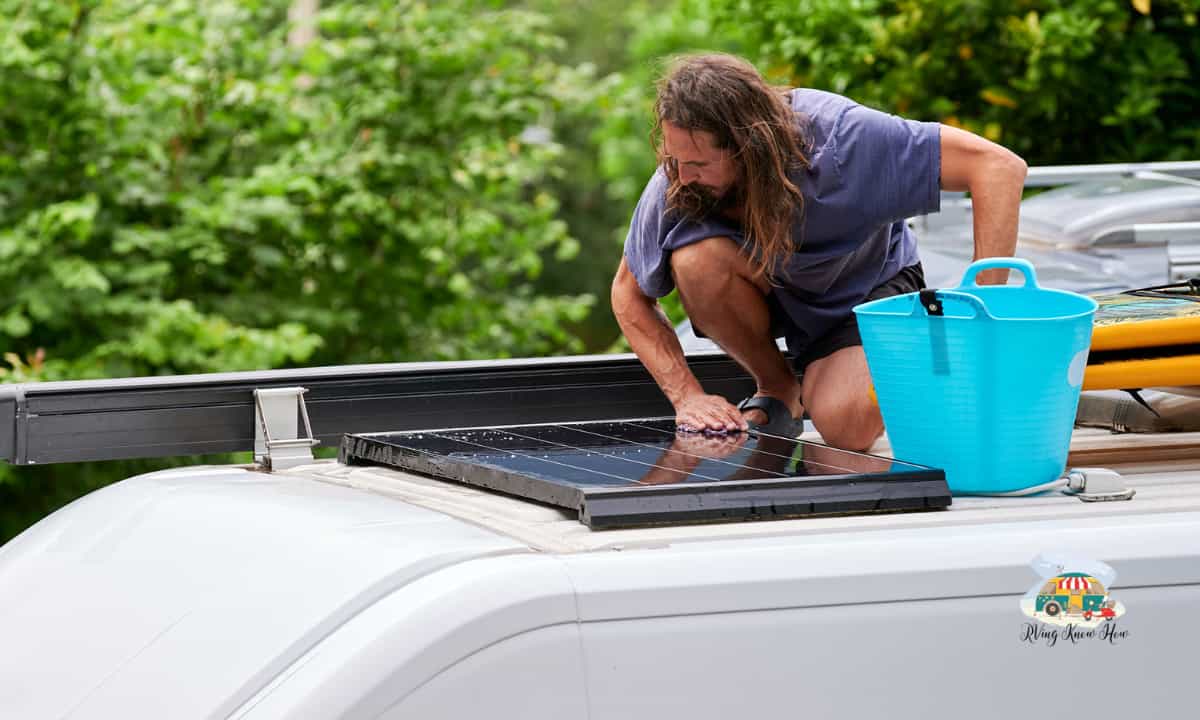
2 Comments
Robert Duncan
3 years agoNot our experience. We have a Thor Chateau with a tankless hot water heater. It is worthless. Water pressure and flow are critical to a tankless heater. Water pressure and flow are very different from RV location to location even with a pressure regulator. To adjust our heater to semi shower, we have to remove a section of the counter under the kitchen sink and adjust the water inflow so too much cold water does not come in to quickly, or you loose hot water quickly in the shower, and then sometimes not enough comes in to get hot water in the sinks. A constant issue. Avoid where possible.
Larry Compter
1 year agoIn addition, tankless heaters don’t work in the cold. Consider this warning from the manual for our Furrion tankless heater:
“In frost conditions (below 39 degrees), water in pipes, faucets and appliance may freeze. If freezing conditions could occur, winterize the water heater.”
So, unless you only camp in Florida, you might want to reconsider a tankless unit.